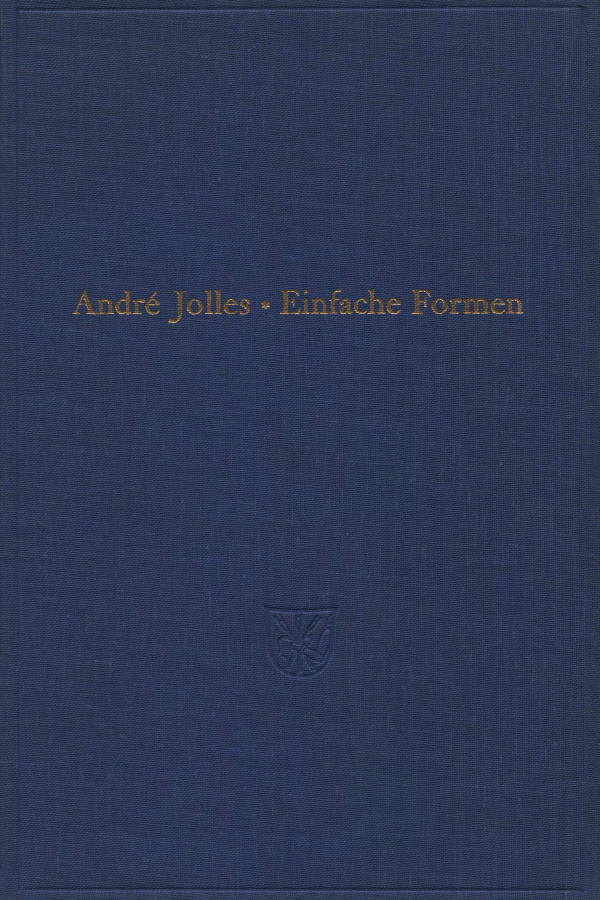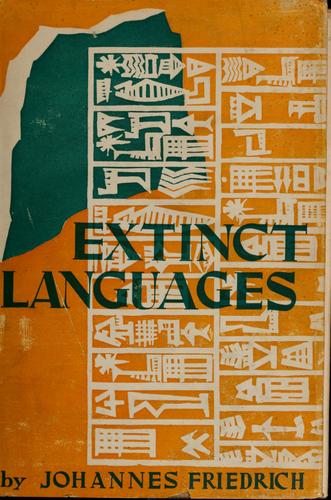André Jolles: Einfache Formen: Legende, Sage, Mythe, Ratsel, Spruch, Kasus, Memorabile, Marchen, Witz (1930–) [DE, ES]
Filed under book | Tags: · language, linguistics, literary theory, literature, narrative

Das grundlegende Konzept des Buches ist auch 50 Jahre nach Erscheinen der ersten Auflage immer noch gultig: Die Herausarbeitung der bestimmenden Konturen erzahlerischer Grundformen, die vom Autor als morphologische “Urformen” – im goetheschen Sinn – verstanden werden. In ihrer meist anonymen Erscheinungsweise nehmen sie eine Zwischenstellung zwischen “volkstumlicher” und “literarischer” Dichtung ein, was sich auch in ihrer Erforschung durch die volkskundliche und die literaturwissenschaftliche Disziplin ausdruckt.
First published in 1930
Publisher Max Niemeyer, Tübingen, 1968
272 pages
Fredric Jameson on Jolles in Brecht and Method
Wikipedia (DE)
Einfache Formen (German, 4th Edition, 1930/1968, via dbnl.org)
Einfache Formen (German, 1930/1969, no OCR)
Las formas simples (Spanish, trans. Rosemarie Kempf Titze, 1972, via Perseguidor)
Matthew Fuller, Andrew Goffey: Evil Media (2012)
Filed under book | Tags: · algorithm, art, artificial intelligence, business, code, computing, data, database, event, governance, information, interaction, interface, knowledge, labour, language, machine, management, market, media, media theory, memory, military, networks, philosophy, political theory, politics, power, programming, software

“Evil Media develops a philosophy of media power that extends the concept of media beyond its tried and trusted use in the games of meaning, symbolism, and truth. It addresses the gray zones in which media exist as corporate work systems, algorithms and data structures, twenty-first century self-improvement manuals, and pharmaceutical techniques. Evil Media invites the reader to explore and understand the abstract infrastructure of the present day. From search engines to flirting strategies, from the value of institutional stupidity to the malicious minutiae of databases, this book shows how the devil is in the details.
The title takes the imperative “Don’t be evil” and asks, what would be done any differently in contemporary computational and networked media were that maxim reversed.
Media here are about much more and much less than symbols, stories, information, or communication: media do things. They incite and provoke, twist and bend, leak and manage. In a series of provocative stratagems designed to be used, Evil Media sets its reader an ethical challenge: either remain a transparent intermediary in the networks and chains of communicative power or become oneself an active, transformative medium.”
Publisher MIT Press, 2012
ISBN 0262304406, 9780262304405
235 pages
Review: Nicholas Holm (Media Int’l AU, 2013), Neural (2013).
Evil media on Monoskop wiki
PDF (updated on 2024-4-13)
HTML (added on 2015-8-28)
See also YoHa, et al., Evil Media Distribution Centre, 2013.
Comments (2)Johannes Friedrich: Extinct Languages (1954/1957)
Filed under book | Tags: · antiquity, cuneiform, language, writing

This is the story of the art of deciphering forgotten languages and scripts. In this engaging and readable book author Friedrich, one of the foremost experts in both linguistics and archaeology, first describes the languages and scripts of the Ancient Orient, then proceeds on an intellectual journey that will take the reader through Egyptian Hieroglyphics, the cuneiform writing of Mesopotamia, the interpretation of Sumerian records, the scripts of the hittites and finally the languages of Ancient Italy.
First published as Entzifferung Verschollener Schriften und Sprachen, Springer, 1954
Translated by Frank Gaynor
Publisher Philosophical Library, New York, 1957
182 pages
via Archive.org
Review (Herbert H. Paper, Language, 1955)
PDF (no OCR)
Comment (0)
